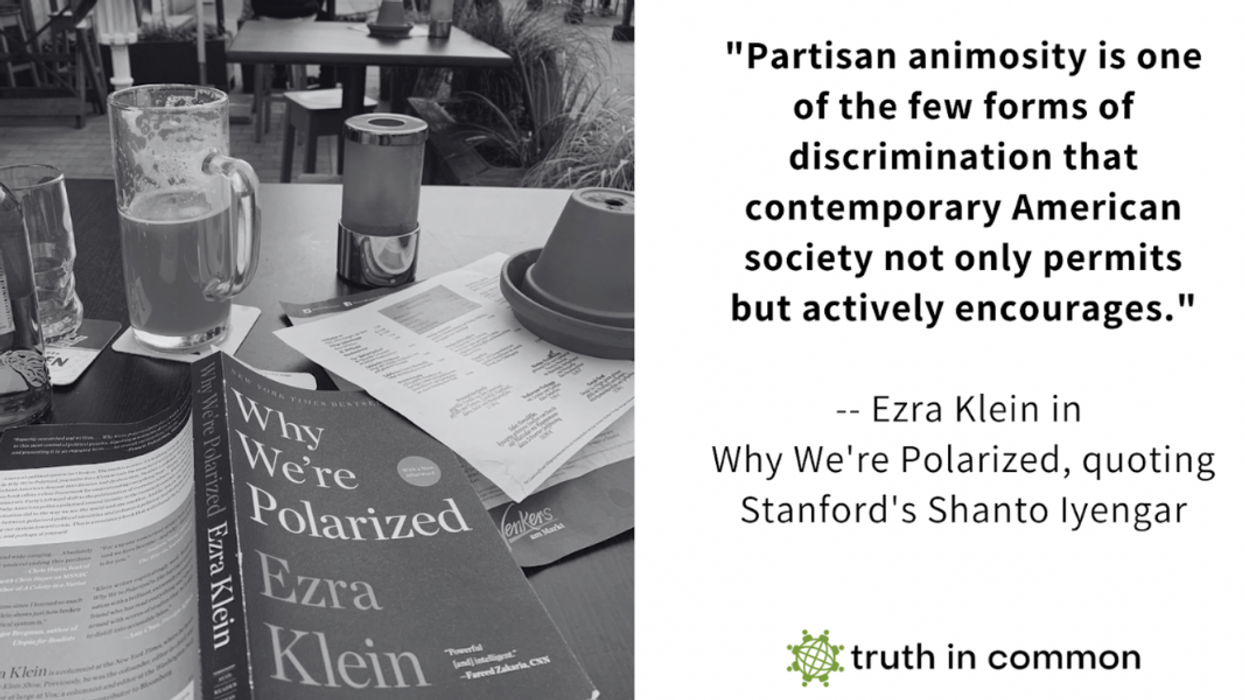Deanna Troust is a communications and social change strategist and founder of 3 Stories Communications and Truth in Common, a new initiative that helps communities and businesses find common ground and restore fact-based decision making. She lives with her bicultural family and rescue dog in Washington, DC’s eclectic Adams Morgan neighborhood.
A group of Florida companies is suing their home state for its so-called Stop WOKE Act, claiming it inhibits their rights to free speech. They wrote that if allowed to stand the law will effectively “chill employers’ speech concerning diversity, equity, and inclusion and disrupt employers’ ability to determine how best to train their employees.”
The Act and its opposition are stark evidence that polarized viewpoints and decision making aren’t relegated to our communities. They’re affecting workplaces as well.
The irony is that diversity, equity and inclusion (DEI) initiatives have the potential for stemming the very us/them dynamics the Act reviles. Done well, they remove shame and blame from conversations we need to be having, not enhance them, because no one learns that way. In today’s polarized environment, they’re wise to address viewpoint diversity – and the external information environment that’s helping to polarize those views – as well.
I’ve worked as a communications strategist in DEI consulting for six years and have seen the best results when the work is strategic – grounded in employee voices, aligned with organizational goals and courageous in addressing pain points. The latter can include inequities in pay or advancement, challenging leadership behavior, generational disconnects and more. Dynamics like these disproportionately affect employees of color, LGBTQ+ individuals, women, those with disabilities and so on; they just do. Some colleagues have worked in DEI for decades, and they’ve seen it all.
Enter polarization as a workplace dynamic. A recent report by Business for America and Civic Health Project found that 69 percent of leaders interviewed “ reported negative effects from political/social divides on their company’s employees and culture. ” Most workplaces include a mix of viewpoints, and stigmatizing those in the minority can lead to disenfranchisement and conflict. It can even affect retention – imagine you’re an employee who’s experiencing that and who works remotely? If you’re fortunate to have job mobility, how long would you stay?
Perhaps due to my small-town roots, I notice these dynamics. I also see them with my clients – I recently convened a focus group for employees with diverse political viewpoints, the first of its kind for me and an incredibly constructive and empathetic conversation. Common ground isn’t as elusive as we think.
Yet I’ve hesitated to talk much about DEI and polarization, perhaps from fear of a knee-jerk reaction or claims I’m distracting from other goals. As we approach National Week of Conversation, though, it seemed like the right time.
Polarization stifles conversation about anything, it seems, but the weather. It can disrupt productivity and hamstring the relationship-building organizations are desperately trying to revive. It thrives on misinformation and as Florida has shown, weaponizes the work itself.
Bridging political viewpoints – the work of over 500 organizations in the ListenFirst coalition – involves pausing to listen, checking our assumptions, conversing respectfully and recognizing that sitting with discomfort can help us grow. These same principles are foundational for creating cultures where people thrive. Bridging even adds a concept to our toolbox: intellectual humility, or people’s willingness to maintain open minds when presented with different viewpoints and moderate the urge to appear “right.”
Now some will say that DEI efforts are left-leaning by nature and those involved would have trouble welcoming “the other.” To that I’d ask, is that true or are we simply politicizing this work, as we do everything else? Perception is reality, though, and if this bias exists it’s on those involved to own it or take a more balanced approach.
There’s also the concern that embracing viewpoint diversity would make DEI initiatives less effective in helping those most affected by inequities. I hear that, and it’s OK to prioritize as long as you’re clear about it. But if a chunk of your workforce is refusing DEI trainings because they’ve been influenced by the critical race theory drama, shouldn’t you address the elephant in the room?
Cultures don’t automatically adapt to challenging external realities, and our current realities are tough. Like the business benefits of diversifying the workforce, though, the case for strengthening culture is clear: In a recent Korn Ferry report, leaders from top companies ranked organizational culture as the most crucial but underrated determinant of future business success.
Whatever culture-building strategies organizations choose – from mitigating bias in the HR lifecycle to fostering courageous conversations – leaders need to be intentional in explaining the “what,” “why,” and “who.” If we assume everyone in the organization has a different idea of the desired outcomes for the initiative and the pathways for achieving it, that’s the right starting point.
We need resilient organizational cultures more than ever right now, and we should embrace any attempts to make them so – while addressing here-and-now realities like polarization and division. As this year’s Edelman Trust Barometer study clearly found, at the moment workplaces may be our only hope.


















 Senate Committee on Commerce, Science, and Transportation ranking member Sen. Maria Cantwell (D-WA) (R) questions witnesses during a hearing in the Russell Senate Office Building on Capitol Hill on February 10, 2026 in Washington, DC. The hearing explored the proposed $3.5 billion acquisition of Tegna Inc. by Nexstar Media Group, which would create the largest regional TV station operator in the United States. (Photo by Chip Somodevilla/Getty Images)
Senate Committee on Commerce, Science, and Transportation ranking member Sen. Maria Cantwell (D-WA) (R) questions witnesses during a hearing in the Russell Senate Office Building on Capitol Hill on February 10, 2026 in Washington, DC. The hearing explored the proposed $3.5 billion acquisition of Tegna Inc. by Nexstar Media Group, which would create the largest regional TV station operator in the United States. (Photo by Chip Somodevilla/Getty Images)
